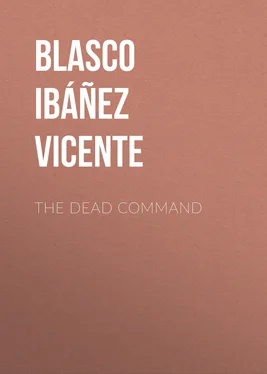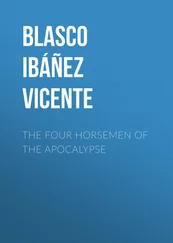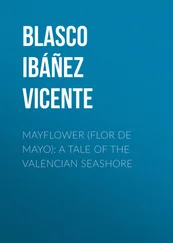Vicente Blasco Ibáñez - The Dead Command
Здесь есть возможность читать онлайн «Vicente Blasco Ibáñez - The Dead Command» — ознакомительный отрывок электронной книги совершенно бесплатно, а после прочтения отрывка купить полную версию. В некоторых случаях можно слушать аудио, скачать через торрент в формате fb2 и присутствует краткое содержание. Жанр: foreign_prose, foreign_antique, на английском языке. Описание произведения, (предисловие) а так же отзывы посетителей доступны на портале библиотеки ЛибКат.
- Название:The Dead Command
- Автор:
- Жанр:
- Год:неизвестен
- ISBN:нет данных
- Рейтинг книги:5 / 5. Голосов: 1
-
Избранное:Добавить в избранное
- Отзывы:
-
Ваша оценка:
- 100
- 1
- 2
- 3
- 4
- 5
The Dead Command: краткое содержание, описание и аннотация
Предлагаем к чтению аннотацию, описание, краткое содержание или предисловие (зависит от того, что написал сам автор книги «The Dead Command»). Если вы не нашли необходимую информацию о книге — напишите в комментариях, мы постараемся отыскать её.
The Dead Command — читать онлайн ознакомительный отрывок
Ниже представлен текст книги, разбитый по страницам. Система сохранения места последней прочитанной страницы, позволяет с удобством читать онлайн бесплатно книгу «The Dead Command», без необходимости каждый раз заново искать на чём Вы остановились. Поставьте закладку, и сможете в любой момент перейти на страницу, на которой закончили чтение.
Интервал:
Закладка:
Gustave Doré, according to report, had sketched his most fantastic conceptions in these olive orchards, steeped in the mysteries of centuries. Recollection of this artist recalled to Jaime's mind others more celebrated who had also passed along this road, and had lived and suffered in Valldemosa.
Twice he had visited the Cartuja merely to see the places immortalized by the sad and unhealthy love of a pair of famous persons. His grandfather had often told him of "the Frenchwoman" of Valldemosa and her companion "the musician."
One day the inhabitants of Majorca and the people of the Peninsula who had taken refuge on the island, fleeing from the horrors of civil war, saw a strange couple disembark, accompanied by a boy and girl. It was in 1838. When their luggage was landed the islanders were astounded by an enormous piano, an Erard instrument of which but few were to be seen in those days. The piano was held in the custom house while the tangle of certain administrative scruples was unraveled, and the travelers sought lodging at an inn, and later rented the estate of Son Vent, in the environs of Palma. The man seemed to be ill; he was younger than the woman, but wasted by suffering, pale, with the transparent pallor of the consecrated wafer, his limpid eyes glowing with fever, his narrow chest shaken by harsh and continuous coughing. A fine, silky beard shaded his cheeks; a black, shaggy head of hair like a lion's mane crowned his forehead and hung down behind in a cascade of curls. She was strong and vigorous and did all the work of the house like a good bourgeoise more willing than skilled in such labors. She played with her children like a girl, and her kindly, smiling face clouded only when she heard the cough of the "beloved invalid." An atmosphere of exotism, of irregular existence, of protest against conventional custom, seemed to surround this vagabond family. She dressed in fantastic gowns, and wore a silver dagger thrust in her hair, a romantic ornament which scandalized the pious Majorcan dames. Besides, she did not go to mass in the city, nor make calls; she did not go out of her house except to play with her children or to entice the poor consumptive out into the sunshine, leaning on her arm. The children were as extraordinary as the mother. The girl went dressed like a boy that she might run with greater freedom.
Soon island curiosity ferreted out the names of these strangers of alarming peculiarities. She was a French woman, a writer of books; Aurore Dupin, the illustrious Baroness Dudevant separated from her husband, who made a world-wide reputation through her novels, which she signed with a masculine given name, and the surname of a political assassin, George Sand. The man was a Polish musician, of delicate constitution, who seemed to leave a portion of his existence in each one of his works, and who felt himself dying at twenty-nine years of age. He was called Frederic François Chopin. The children belonged to the novelist, who was about thirty-five.
Majorcan society, bound up in its traditional preoccupations, like a mollusk in its shell, and hostile by instinct to impious novelties from Paris, waxed indignant over this scandal. They were not married! And she wrote novels which startled respectable people by their audacity! Feminine curiosity wished to read them, but only Don Horacio Febrer, Jaime's grandfather, received books in Majorca, and the small volumes of "Indiana" and "Lelia," belonging to him, passed from hand to hand without being understood by their readers. A married woman who wrote books and lived with a man who was not her husband! Doña Elvira, Jaime's grandmother, a señora from Mexico, whose portrait he had so often seen, and whom he imagined always dressed in white with her eyes turned heavenward and her gilded harp between her knees, called upon the retiring woman at Son Vent. She enjoyed overwhelming the ladies of the island who did not know French with the superiority of the foreigner; she listened to the novelist's lyric eulogies of the originality of this African landscape, with its little white houses, spiny cacti, slender palms, and aged olive trees, in such striking contrast to the harmonious order of the broad fields of France. Then Doña Elvira, in the social gatherings at Palma, defended the authoress with fervor—a poor emotional woman, whose everyday life was more like that of a Sister of Charity, more full of care and sorrow than of passion and pleasure. The grandfather took it upon himself to intervene and prohibit his wife's calls in order to quiet neighborhood gossip.
The scandalous pair was completely ostracized. While the children were frolicking like young savages in the fields with their mother, the sick man sat at his dormitory window, or peeped out of his doorway, seeking a ray of sunshine. In the small hours of the night came the visit of the muse, and the man, sick and melancholy, seated himself at the piano, where, coughing and moaning, out of the bitterness of his spirit he improvised his voluptuous music.
The owner of the estate of Son Vent, a bourgeois of the city, ordered the foreigners to move, as if they were a band of gypsies. The pianist was a consumptive and the landlord did not wish to have his property infected. Where should they go? To return to their own country would be difficult since it was in the middle of winter, and Chopin trembled like a forsaken bird, thinking of the chill of Paris. He loved the island, despite the inhospitable people, because of the suavity of its climate. The Cartuja of Valldemosa offered itself as their sole refuge, a building devoid of architectural beauty, with no other charm than that of its medieval antiquity, situated in the mountains with pine-covered slopes, having, like delicate curtains tempering the sun's ardor, plantations of almond and palm, through the branches of which the eye could make out the green plain and the distant sea. It was a monument almost in ruins, a monastery suggesting melodrama, gloomy and mysterious, in the cloisters of which camped vagabonds and beggars. To enter it one must cross the old cemetery of the friars with its graves disturbed by the roots of forest trees thrusting bones up to the very surface. On moonlight nights a white phantom stalked through the cloisters, the shade of a wicked friar who haunted the place of his misdeeds, while awaiting the hour of redemption.
Thither went the fugitives one stormy winter day, buffeted by wind and rain, traveling along the same route which Febrer now followed, but by an old road which barely deserved the name. The wagons of the caravan climbed, as George Sand said, "with one wheel on the mountain and the other in the bed of a gully." The musician, wrapped in his cape, sat trembling and coughing under the canvas cover, throbbing with pain as the vehicle jolted over the rough ground. The novelist herself followed on foot over the worst places, leading her children by the hand on this vagabond journey.
They spent the entire winter in the isolation of the Cartuja. She, wearing Turkish slippers, the little dagger always thrust into her ill-combed hair, courageously did the cooking with the assistance of a young peasant girl who took advantage of every opportunity to gorge herself with the dainties intended for the "beloved invalid." The urchins of Valldemosa stoned the little French children, calling them Moors and disbelievers in God; the women cheated the mother when they sold her provisions, and moreover they dubbed her "the witch." They all made the sign of the cross when they met these "gypsies" who dared to live in a cell at the monastery, neighbors to the dead, in constant communication with the spectral friar who stalked through the cloister.
By day, while the invalid was resting, George Sand prepared the broth, and with her slender, white, artistic hands, helped the maidservant to peel the vegetables; then, with, her two children she would race down to the abrupt, tree-covered beach of Miramar where Ramon Lull had established his school of oriental study. Only at the approach of night did her real existence begin.
Читать дальшеИнтервал:
Закладка:
Похожие книги на «The Dead Command»
Представляем Вашему вниманию похожие книги на «The Dead Command» списком для выбора. Мы отобрали схожую по названию и смыслу литературу в надежде предоставить читателям больше вариантов отыскать новые, интересные, ещё непрочитанные произведения.
Обсуждение, отзывы о книге «The Dead Command» и просто собственные мнения читателей. Оставьте ваши комментарии, напишите, что Вы думаете о произведении, его смысле или главных героях. Укажите что конкретно понравилось, а что нет, и почему Вы так считаете.












